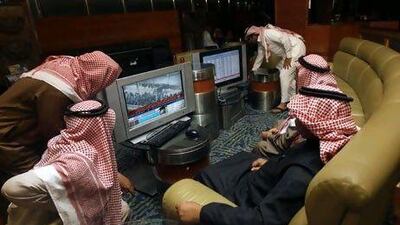Arabic television news stations have pulled in viewers during the wave of protests that have swept parts of the Mena region, but they have failed to pull in more advertising dollars.
Audience figures for television news channels in key media markets such as Saudi Arabia have doubled since the beginning of the protests. According to the monitoring company Ipsos MediaCT, news channels had an 11 per cent share in Saudi Arabia in December but a 22 per cent share by February as unrest widened in the region.
"TV viewing has remained overall stable at the high average of nearly six hours, but the programmes and channels selection has seen a huge swell in demand for news," says Sami Raffoul, the general manager of Pan Arab Research Center (Parc), one of the biggest providers of media data.
But despite these rising figures at Arab channels such as Al Arabiya and Al Jazeera, advertising spending has dipped. TV advertising is big business in Saudi Arabia, where the average adult watches almost six hours of television a day, according to Parc figures. In February, the average resident of Saudi Arabia watched Al Arabiya news station for 47 minutes a day - compared with just 14 minutes a year ago, Parc reports.
But this has not helped advertising revenue at Al Arabiya. During the Arab protests, ad revenue has dropped by at least 15 per cent.
"The channel witnessed during January and February a drop in its commercial revenues," says Mazen Hayek, the group director of PR and commercial at the MBC Group, which operates Al Arabiya news station. "I would say a solid 15 per cent drop in the first two months of the year."
The main reason for the decline is that news channels are unable to accommodate as much advertising because of fewer commercial spots, Mr Hayek said. Sponsored shows are also being cut to make way for breaking news.
Another problem cited by Mr Hayek is that media agencies, which buy advertising on behalf of their clients, may be reluctant to change their spending plans.
And major brands are reluctant to book advertising on channels that carry breaking news because they do not want to risk being associated with scenes of violence.
"Many of the brand owners stay away from images of death and war," says Mr Raffoul.
"They don't want to associate their brand with a programme that is troubling to people."
Mr Raffoul also pointed out that there had been a wider impact on the advertising industry after the unrest in parts of the Mena region.
In Egypt, TV advertising has been virtually decimated during the past two months, with spending down 97 per cent in February and 78 per cent in March compared with the same months last year, Parc reports.
Spending in February was down from US$49 million (Dh179.9m) to less than $1m, although Parc's dollar estimates do not take into account free or discounted ads.
The newspaper industry in Egypt was also badly hit, with advertising spending down 45 per cent in the first quarter of this year compared with last year.
Mr Raffoul attributes this to the difficulties of distributing newspapers in the face of "barricades, interruption in the traffic flow and curfews".
"In Egypt, the leading titles circulate in millions. Any breakdown can bring the circulation down to hundreds of thousands, and that would have a big impact," he says.
Turmoil in one Arab country can also cause a ripple effect elsewhere.
"The Arab world is one language, one body. If one part of the body aches, it's the whole of the Arab world that suffers," Mr Raffoul says.
But cutting advertising budgets in times of adversity is not the answer, he says. "Advertising in times of economic depression will earn you a lot of momentum and equity in better times to come," he says.
Still, advertisers seem reluctant to heed his message. According to a panel of media executives polled by The Nationalthis year, advertising spending in the Mena region is forecast to decline by 3.7 per cent this year because of the impact of political unrest.
So what does this mean for the region's TV news stations, which have been propelled into the international spotlight during the unrest?
Mr Raffoul says viewership for news stations is already beginning to decline.
"February was really a high-intensity period," he said. "In March, people have become accustomed to the events. It will continue to decline in April. There will be less emphasis on news stations."
But the protests have also helped the region's news channels, despite advertisers' reluctance to spend. Covering breaking news may be expensive, but the brand value of stations such as Al Arabiya and Al Jazeera has been heightened during the uprisings, and that is likely to have a long-term commercial benefit.
"When you advertise on a news station in normal days, you advertise because you believe a station is serious and has authority," says Mr Raffoul. "It is heightening the brand."

